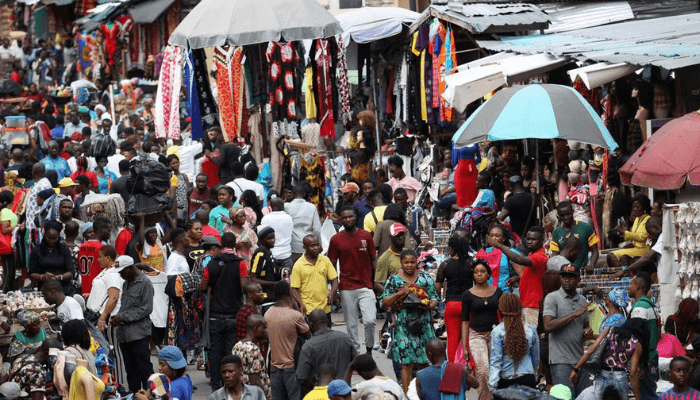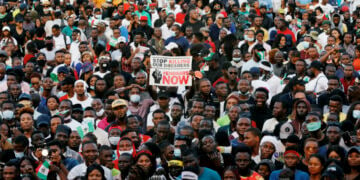The economic data emerging from 2024 paints a sobering picture of what lies ahead for Nigeria in 2025. When a nation witnesses the tragic spectacle of its citizens dying in stampedes for food palliatives, it becomes clear that we have crossed a critical threshold.
The confluence of petroleum subsidy removal and naira devaluation has created an economic maelstrom that threatens to pull more Nigerians into the abyss of poverty.
The high fuel prices have triggered increases in basic commodities and services, while soaring inflation and widespread job losses have further compounded the country’s growing poverty crisis. Several companies have left the country in droves while many local companies have either closed down or relocated due to currency volatility and rising operational costs.
It is disturbing that while established companies have exited the country over operational difficulties and pulled out investments worth billions of dollars, the reforms initiated by President Bola Tinubu appear slow in filling the gap despite the much-touted drive for Foreign Direct Investment (FID).
GlaxoSmithKline, a well-known multinational pharmaceutical and biotechnology company, announced in August 2023 that it would cease operations in Nigeria. Consequently, Nigeria will have to import and pay more for off-the-counter drugs made by the company. In a country where more people have reportedly fallen ill because of poor nutrition, this indeed is a precarious situation.
The Procter & Gamble (P&G) has also left Nigeria due to challenges of operating a dollar-denominated organisation in Nigeria. Within the first six months of 2024, over five companies exited Nigeria as the business climate deteriorated: These include Microsoft, Total Energies, PZ Cussons Nigeria Plc, among others.
These companies have reportedly relocated to neighbouring countries that offer more conducive business environments, allowing them to manufacture their products while maintaining access to the Nigerian market. Their exit suggests that economic challenges, naira instability, and regulatory difficulties have severely impacted the viability of investment in Nigeria.
The National Bureau of Statistics (NBS) recently released a report indicating that Nigeria’s headline inflation figure for November 2024 had hit an all-time high of 34.6 percent, while food inflation stands at approximately 40 percent in a country already grappling with massive poverty triggered by increasing food prices.
This disturbing trend has persisted over the past three months, with the November inflation rate rising by 0.72 percentage points compared to October 2024, according to the latest Consumer Price Index (CPI) report from the NBS.
According to a recent World Bank report, approximately 14 million more Nigerians have fallen into poverty in the last 18 months. This situation is particularly alarming given that over 133 million Nigerians were already suffering from multidimensional poverty last year.
To address these challenges, the government has presented a N47.9 trillion budget to the National Assembly (NASS). Through this budget, President Tinubu aims to tackle the country’s most pressing needs, including reducing inflation from 34.6 percent to 15 percent and strengthening the naira from approximately N1,700 to N1,500 per dollar.
However, the budget’s deficit of over N13 trillion raises concerns, as the government is expected to borrow more to fund it.
As reported by this newspaper on Monday, December 30, 2024, some financial analysts and economic experts remain optimistic about a stronger Naira value and lower Premium Motor Spirit (PMS) prices in 2025, driven by improved foreign exchange inflows and reduced fuel imports.
This optimism stems from increased oil production and domestic refining capabilities, which may ease pressure on the currency. These improvements could stabilise PMS prices, as evidenced by minimal price reductions already observed in some parts of the country.
President Tinubu’s New Year message, while attempting to strike an optimistic tone, must be viewed against this harsh backdrop. His ambitious target of reducing inflation from 34.6 percent to 15 percent by the end of 2025 appears more aspirational than realistic, especially when considering the structural challenges facing the economy. The proposed N47.9 trillion budget, carrying a deficit of over N13 trillion, raises more questions than it answers about the government’s fiscal strategy.
The administration’s optimism about strengthening the naira from N1,700 to N1,500 per dollar seems to rest on anticipated improvements in foreign exchange inflows and reduced fuel imports.
True economic revival will require more than marginal improvements in specific sectors; it demands a holistic transformation of Nigeria’s economic architecture.
In 2025, the government must move beyond rhetoric to demonstrate concrete action. The promised reduction in inflation, strengthening of the naira, and expansion of credit access must be backed by clear, measurable steps and timelines.
Most importantly, there must be a realistic assessment of what can be achieved in the short-term while building foundations for long-term economic stability.
While 2025 presents significant challenges, Nigeria can avoid economic catastrophe if the government implements pragmatic policies to match its optimistic projections. The focus must shift from managing symptoms to addressing root causes, from short-term palliatives to sustainable solutions. Otherwise, we risk turning what is currently an economic crisis into a social catastrophe.





